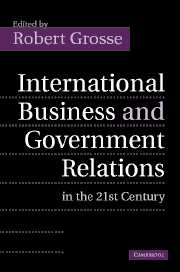Book contents
- Frontmatter
- Contents
- List of figures
- List of tables
- List of contributors
- Acknowledgments
- Introduction
- Part I History and theories of analysis of international business–government relations
- Part II The shifting international business–government partnership
- Part III Bargaining theory and the obsolescing bargain
- 10 From the obsolescing bargain to the political bargaining model
- 11 The bargaining view of government–business relations
- 12 Shifts of Chinese government policies on inbound foreign direct investment
- 13 Has the obsolescing bargain obsolesced? Negotiating with foreign investors
- Part IV Host and home government views of international business
- Conclusions
- References
- Select bibliography of J. N. Behrman's works
- Index
13 - Has the obsolescing bargain obsolesced? Negotiating with foreign investors
Published online by Cambridge University Press: 22 September 2009
- Frontmatter
- Contents
- List of figures
- List of tables
- List of contributors
- Acknowledgments
- Introduction
- Part I History and theories of analysis of international business–government relations
- Part II The shifting international business–government partnership
- Part III Bargaining theory and the obsolescing bargain
- 10 From the obsolescing bargain to the political bargaining model
- 11 The bargaining view of government–business relations
- 12 Shifts of Chinese government policies on inbound foreign direct investment
- 13 Has the obsolescing bargain obsolesced? Negotiating with foreign investors
- Part IV Host and home government views of international business
- Conclusions
- References
- Select bibliography of J. N. Behrman's works
- Index
Summary
Introduction
Surely there can be no questioning the fact that there has been, over the last few decades, a fundamental change in the nature of the relations between multinational corporations and the governments of host developing economies, in the direction of more welcoming attitudes toward FDI on the part of these governments? And should this change not significantly reduce the likelihood of friction in the international business–government relationship?
The fact of change is certainly unquestionable. For several years UNCTAD has followed changes in investment policies in host economies. Based on its analysis, UNCTAD contends that 95 percent of the changes in investment policies across countries between 1991 and 2002 have been in the direction of greater investment liberality (UNCTAD, 2003b).
The implications of changes in attitudes toward investors on the part of host governments on the likelihood of investment disputes and contract continuity are, however, more contentious.
Does greater investment liberality mean that disputes between investors and host governments are no longer likely? In certain sectors, in particular, might there not remain the possibility of friction between these sets of actors during the twenty-first century? (Wells and Gleason, 1995). Does the change in the environment for FDI mean that the bargaining power cycle between host governments and multinational corporations, in which the relative bargaining power shifts to the host government after investments have been made, leading at times to the premature termination of these bargains (obsolescing bargain, vernon, 1971), has itself ended its cycle of explanatory usefulness and obsolesced?
- Type
- Chapter
- Information
- Publisher: Cambridge University PressPrint publication year: 2005
- 2
- Cited by



